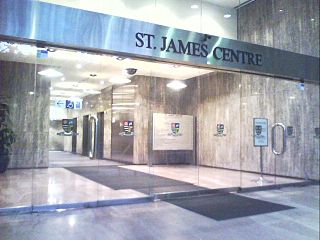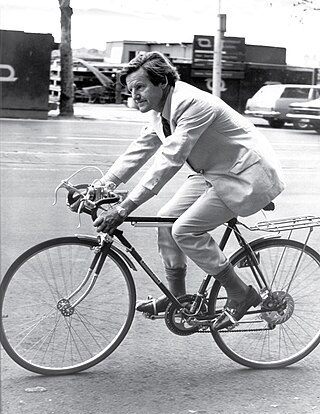
Neville Kenneth Wran, was an Australian politician who was the Premier of New South Wales from 1976 to 1986. He was the national president of the Australian Labor Party (ALP) from 1980 to 1986 and chairman of both the Lionel Murphy Foundation and the Commonwealth Scientific and Industrial Research Organisation (CSIRO) from 1986 to 1991.

The Royal Commission into the New South Wales Police Service, also known as the Wood Royal Commission, was a royal commission held in the State of New South Wales, Australia between 1995 and 1997. The Royal Commissioner was Justice James Roland Wood. The terms of reference were to determine the existence and extent of corruption within the New South Wales Police; specifically, it sought to determine whether corruption and misconduct were "systemic and entrenched" within the service, and to advise on the process to address such a problem.
The Royal Commission of Inquiry in respect of certain matters relating to allegations of organised crime in clubs also known as the Moffitt Royal Commission (1973–74) was one of the first Australian Royal commissions to specifically investigate the extent and activities of organised crime in the state of New South Wales, Australia. Its common title was taken from the name of its chairperson, NSW Supreme Court judge Athol Moffitt.
Leonard Arthur McPherson was one of the most notorious and powerful Australian career criminals of the late 20th century. McPherson is believed to have controlled most of Sydney's organised crime activity for several decades, alongside his contemporary Abe Saffron and associate, bookmaker George Freeman.
Ray "Gunner" Kelly, MBE, was an Australian police officer who was a detective inspector with NSW Police, he became famous during his career owing to his high-profile cases and results, but who was later alleged to have been deeply involved in corruption and organised crime.

Abraham Gilbert Saffron was an Australian hotelier, nightclub owner and property developer who was one of the major figures in organised crime in Australia in the latter half of the 20th century.

John Keith Dunstan, known as Keith Dunstan, was an Australian journalist and author. He was a prolific writer and the author of more than 35 books.
Quentin Dempster AM, is an Australian journalist and author.
Michael John Bailey was an Australian television and radio weather presenter, journalism educator, political aspirant and football club chairman.

The New South Wales Crime Commission is a statutory corporation of the Government of New South Wales. It is constituted by the Crime Commission Act 2012, the object of which is to reduce the incidence of organised crime and other serious crime in the state of New South Wales, Australia.
Organised crime in Australia refers to the activities of various groups of crime families, organised crime syndicates or underworld activities including drug trafficking, contract killing, racketeering and other crimes in Australia.

Adam Walters is a Walkley Award winning Australian journalist author and Brisbane Bureau Chief for Sky News Australia. He was also a political adviser to former New South Wales Premier, Morris Iemma.
John Edward Hatton is a former Australian politician, and a National Trust of Australia nominated Australian Living Treasure. He was the independent member of the Legislative Assembly of the New South Wales parliament for the seat of South Coast from 1973 to 1995. Notably, the allegations about police corruption which Hatton raised in Parliament resulted in the Wood Royal Commission. He is currently a social activist in his local community.
Murray Stewart Riley was an Australian Olympic rowing athlete, who, after leaving a career as a police officer, gained notoriety as a criminal. Riley represented Australia at the 1952 and 1956 Summer Olympics in double scull rowing, winning a bronze medal in 1956. He served as a police officer in Sydney from 1943 until 1962, when he resigned after disciplinary charges were leveled against him. After his resignation from the police, Riley embarked on a criminal career that included convictions for drug trafficking and fraud. He was implicated in the Nugan Hand Bank scandal and associated with leading figures in the American Mafia, including Jimmy Fratianno of the Los Angeles crime family and corrupt Teamsters official Michael Rudy Tham. He died in 2020 at the age of 94.
The history of gangs in Australia goes back to the colonial era. Criminal gangs flourished in The Rocks district of Sydney in its early history in the 19th century. The Rocks Push was a notorious larrikin gang which dominated the area from the 1800s to the end of the 1900s. The gang was engaged in running warfare with other larrikin gangs of the time such as the Straw Hat Push, the Glebe Push, the Argyle Cut Push, the Forty Thieves from Surry Hills, and the Gibb Street Mob.
John Houssam Ibrahim, is a former Kings Cross nightclub owner in Australia. Police allege Ibrahim is a "major organised-crime figure" and was labelled as the "lifeblood of the drugs industry of Kings Cross" during the 1995 Wood royal commission. However, Ibrahim strongly denies this, and has not been convicted of any related crime.

George David Freeman was a Sydney bookmaker, racing identity and illegal casino operator. He was linked to the Sydney drug trade during the 1970s and 1980s, was named in several Royal Commissions into organised crime and had links with American crime figures. Freeman served several prison terms for theft between 1951 and 1968 but was never brought to trial for any of his later alleged crimes, receiving only monetary fines for SP bookmaking in the mid-1980s. Freeman survived a murder attempt in 1979, was married twice, published an autobiography and died in 1990 of heart failure related to asthma and pethidine addiction.
Adam Shand is an Australian writer and journalist.
Jschool is an independent journalism college based in Brisbane, Australia. The college, founded in 2001, admitted its first students in 2002. Jschool is directed and was founded by journalist and educator John Henningham.
Nick McKenzie is an Australian investigative journalist. He has won 14 Walkley Awards, been twice named the Graham Perkin Australian Journalist of the Year and also received the Kennedy Award for Journalist of the Year in 2020 and 2022. He is the president of the Melbourne Press Club.






